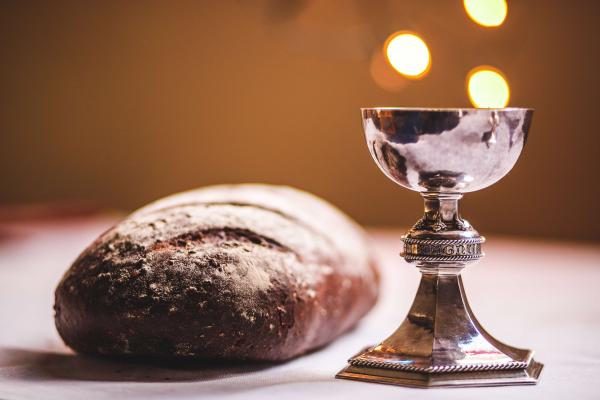My son and daughter’s favorite part of church is communion.
They can finally leave their seats at the back pew where my wife and I have been feeding them snacks, trying to bribe from them their patience. They stand. They walk down the center aisle. They smile at nearly every face they see and wave at many they know. As we approach the front, the pastor takes bread and places the pieces in their small hands.
“Do you know that Jesus loves you?” she asks.
And nearly every Sunday, as broken bread stands for broken bodies, I am struck with the words of James Baldwin, when he wrote that to be born black or a person of color in America means that you must “give up all hope of communion.”
When Baldwin wrote those words he believed that the nation was both a Christian nation and a white nation. White supremacy was the foundation of American rites and rights. Whiteness was a prerequisite to be encircled by compassion and included in citizenship. The denial of communion — the denial of the body of Christ and the rejection from the body politic — was connected to the nation’s original sin.
Communion has a contentious past that has divided groups theologically and denominationally. Whether miracle or metaphor, weekly or infrequently, groups broke themselves over and over because of communion.
For some, the eucharist is an outward sign of a consuming desire for God. In a state of love so deep that it is an all-consuming passion, you want to “eat up” that person.
For others, it is a symbol for nourishment. While bread feeds the body, God feeds the soul. The church provides both in one moment.
For others, communion is a ritualized sharing of a meal, a metaphor for who we share our resources with and who is deserving of those shared resources. There is a host. The table is set. The children of God come to eat from it.
The division is not only doctrinal, but also demographic.
American churches remain segregated. Only 7 percent of congregations in the nation in 2006 were multiracial, meaning no one racial group made up 80 percent or more of attendees. That percentage may have grown since, but over 75 percent of evangelical protestants are white and 86 percent of mainline protestants are white. This is not meant to indicate a lack of faith among communities of color. The opposite is true. Seventy-five percent of African Americans and 59 percent of Latinos believe that religion is very important in their lives . A higher percentage of African Americans and Latinos attend church at least once a week than white Americans. Yet, they congregate separately.
As the rites of American churches remain segregated, American rights remain racialized. The politicization of faith is seen in its partisanship, in the debates over whose lives matter more, black, brown, or blue. White evangelicals comprise a third of Republican voters, while only making up 20 percent of voters nationally. White evangelicals supported President Trump early on and continue to do so. They remain the most prominent group whose majority still supports the president; 72 percent of white evangelicals have a favorable view of Trump. White evangelicals have not shifted their views even as families have been torn apart, children have been put in cages, and white supremacy has been on parade. It is not hard to see that their policy preferences have been shaped by who they see in the pews. They have in their imaginations a vision of who they are nourished by and from, whose resources should be shared and shared with, and who sits at the table.
In an era in which salsa surpasses ketchup and Pan Bimbo purchases Sarah Lee, what will the nation be fed by? As Latinos make up 30 percent of food industry workforce and nearly half of fruit and vegetable preservation workers, who will the nation be fed by? As Latinos are on the verge of becoming nearly a quarter of the population by 2050 and are partners in nearly half of all interracial marriages in the U.S., who will play host? Will those who set the table be invited to it?
Between the miraculous and the metaphorical, my mixed-race Mexican-American children seek out this sacrament. They long for it. They stand for it. They take their place in it. With one brown parent and one white parent holding their hands, they participate in it. Diversity can shatter monolithic morality, question absolutisms, and challenge fundamentalisms with pluralities of experience. In congregations, it can change the moral views of the congregants.
One Sunday, my son went to receive communion. The pastor handed him his bread.
“I want more,” he insisted, unsatisfied with the rite.
His demands were met by the pastor and the church, not diminished. I pray he will be as adamant in demanding his rights and the church will resolute in nourishing those as well.
Got something to say about what you're reading? We value your feedback!







